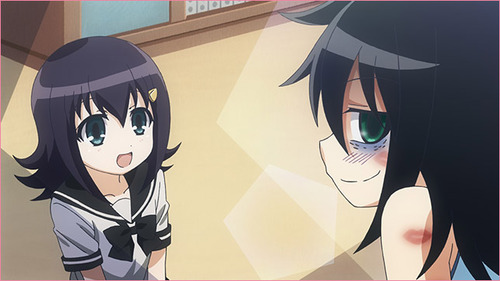
When you’re a kid growing up, I’m sure you’ve all had a younger relative/friend look up to you. He/she will ask a lot of questions about your experience in life. You sometimes may tell outrageous stories to get them amazed. Though how far can you take it if everything’s a big lie? Ask Tomoko Kuroki, star of WataMote, when she tries to impress her younger cousin, Ki-chan. This little episode shows a look at how brutal child psychology can be, but provides a interesting thought about how young children process cues.
If you’re not familiar with WataMote, the story focuses on the life of Tomoko, an awkward young girl who tries to become popular in high school. Her attempts to do so often end up as failures. In Volume 2 of the manga (Episode 8 of the anime), Ki-chan comes over to hang out with Tomoko, much to her chagrin. She used to tell her cousin lies about her experience with boys while the latter was in elementary school. Ki is now in middle school and Tomoko has to up her game to convince her cousin that she’s “cool.” Unfortunately, this leads to physical pain, a horrible misunderstanding that Ki witnesses, and a revelation of how low Tomoko will go to be well-known. Ki feels sympathy for her in the end, but does harbor a sense of disappointment over Tomoko’s behavior.
There was a point in the beginning of the story where Tomoko wonders why she lied to Ki in the first place. You can’t fault her for doing so as learning to lie becomes a growing part of a child’s development. No one wants to be looked down upon. Of course, the big problem is that the lies Tomoko told are pretty much “white lies.” It’s amazing to see the lengths some people may go through to get kids to be happy.
Lies happen all the time. Some argue that society wouldn’t have prospered the way it has if it weren’t for some hidden truths. There’s a time and place to be honest with someone, but it’s often difficult to tell the truth. Lying provides a rush of dopamine, the chemical that gets you excited. This can lead to chronic lying, which ruins the image people may have of you.
Why would anyone like Tomoko continue to mess with a growing child’s mind? The fact that she knew about the possibility of Ki seeing through her makes you go “What the hell is she thinking?” During a hangout with Ki, Tomoko lied about a boy she knew at school being her boyfriend. When the two saw him with another girl, Ki confronted the boy and an embarrassed Tomoko had to get on her knees and bow apologetically to him.
This highlights how most teenagers don’t think about their actions and how they affect others. Yes, Tomoko may have been aware of her own behavior, but she doesn’t take note of Ki’s feelings or even picture an outcome where she loses. Everything is about how Tomoko succeeds, not anyone else’s. Lies help to make someone feel better and ease their stress. For a desperate person who wants to be popular, they will do anything to fit in and if lying happens to be a good method, then so be it.
The final image Ki has of Tomoko is a scene of her cheating in a card game battle against little kids. Children are indeed the most impressionable bunch, but it makes you wonder why some people are a bit obsessed with getting their attention. Is it a matter of bragging to others that you’re good with kids? Of course, it’s easier to pick their brains apart compared to peers. This reflects the idea of thinking about them as an excuse to put off serious matters when it comes to the future.
Ki-chan pities Tomoko and forgives her to a certain extent. She even suggested that she would do something for her. For someone in middle school, she has a sense of maturity and a even better sense of self, unlike her older cousin. A fun note to point out was that there was a “what if?” scenario where Ki knew about Tomoko’s lying tendencies from the start in Chapter 0 of the series. The end of their yearly get-together makes you think of how important it is for children to learn how to forgive others. Though more importantly, they need to learn to forgive themselves. In the case of Ki, she nearly went into full yandere mode on Tomoko. A child must learn to understand the “why”,”what”, and “how” behind frustrating situations.
In the end, it’s not about impressing kids or anyone. It’s about impressing yourself before doing the same for others
(c) Manga Therapy – Where Psychology & Manga Meet – Read entire story here.